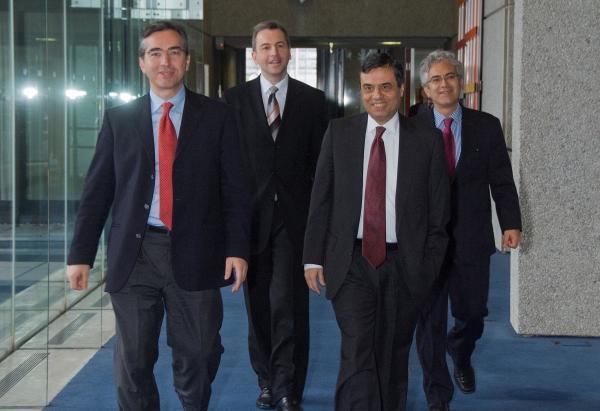
The European Investment Bank and International Monetary Fund today agreed to enhance capacity building cooperation across in Sub-Saharan Africa. Under the agreement, the EIB will support the IMF Regional Technical Assistance Centers in Africa (AFRITACs).
“This landmark agreement will allow the European Investment Bank to contribute €3 million (US$4.5 million) over the next three years towards providing technical assistance and training across Eastern, Western and Southern Africa. These activities complement the EIB’s own operations in Africa by building capacity, supporting financial institutions and contributing to strengthening governance.” added Plutarchos Sakellaris, European Investment Bank Vice President responsible for operations in Sub-Saharan Africa.
“We are very pleased to deepen and broaden the partnership between the EIB and the IMF, to the benefit of our member countries,” said Murilo Portugal, International Monetary Fund Deputy Managing Director during the signing ceremony in Luxembourg.
The EIB operates in sub-Saharan Africa under the ACP-EC Cotonou Partnership Agreement, both with its own resources and as manager of the Investment Facility. With these two windows, the Bank is in a position to meet the financing needs of investment projects with a broad range of instruments, from senior loans to subordinated loans to equity. The EIB’s main objective is to contribute to private sector development, both through direct support for private investments and through support for infrastructure on which the private sector relies. Strengthening the financial sector in Africa is a key element of the EIB’s strategy towards economic development in the region. Since its launch in April 2003, the Investment Facility has provided 2.3 bn EUR of funding, of which 56% went to financial sector projects.
Demand for the IMF’s technical assistance is rising, also in light of the current global economic and financial crisis, as countries work on strengthening their institutions. To meet this rising demand as well as to better coordinate assistance delivery, the Fund strengthens its partnerships with donors by engaging them on a broader, longer-term, and more strategic basis. As a part of these efforts, the IMF recently opened the Central America, Panama, and the Dominican Republic Regional Technical Assistance Center (see Press Release No. 09/236) and intends to open three additional Regional Technical Assistance Centers (RTACs) in Central Asia, and Southern and Western Africa.
Notes for editors:
- The European Investment Bank, the European Union’s financing institution, supports investment projects fostering European development aid and cooperation policies.
- The EIB has been a development partner in many African, Caribbean and Pacific (ACP) countries since 1963. EIB loans in the ACP regions concentrate on fostering private sector-led initiatives, including SME investments that promote sustainable economic growth and help to reduce poverty. The Bank also supports public sector projects that are critical for private sector development and the creation of a competitive business environment.
- This initiative will expand coverage of regional technical assistance centres to all sub-Saharan countries. Two Regional Technical Assistance Centres in Africa (AFRITACs) were created in East and West Africa in 2002 and 2003, another in Central Africa was established in 2007. This agreement will enable the establishment of two more AFRITACS, a second presence in West Africa and one that covers Southern Africa.
- Strengthening the financial sector in Africa is a key element of the European Investment Bank’s strategy towards economic development in the region. The EIB uses local financial intermediaries to promote private sector development under the Cotonou agreement. AFRITACs provide a solid policy framework for financial sector operations in the region.
- Technical Assistance financed from the Cotonou envelope provides the EIB with a strong instrument to improve the quality and the development impact of its lending operations in the region. The aim of Technical Assistance is to make thorough preparations for investments and to undertake projects more effectively. For this purpose, EUR 40m has been earmarked for TA activity in the region
- IMF Technical Assistance Factsheet: http://www.imf.org/external/np/exr/facts/tech.htm
- Paris Declaration on Aid Effectiveness: http://www.oecd.org/dataoecd/11/41/34428351.pdf

Photographer: EIB ©EIB
Download original

Photographer: EIB ©EIB
Download original

Photographer: EIB ©EIB
Download original

Photographer: EIB ©EIB
Download original